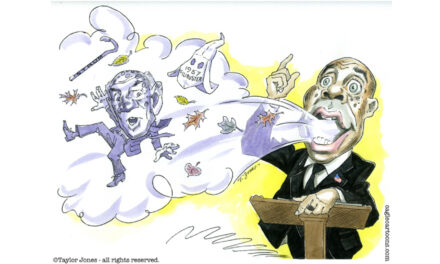
Suspicious Dragonflies and “Handsome Guys,” China Wants Its Citizens to Be Spy Hunters

In the modern world of international intrigue, espionage often brings to mind tuxedo-clad agents with cool gadgets and fast cars. But in China, the reality of spy hunting looks a little different. Forget James Bond — China is asking its people to keep an eye on lighters, napkins, and even overly romantic dating app matches. Under President Xi Jinping’s leadership, the Chinese government has kicked off an all-hands-on-deck campaign, calling on everyday citizens to be on the lookout for foreign spies lurking in their recycling bins, online dating profiles, and even among well-meaning scholarship donors.
This isn’t your typical neighborhood watch program. It’s part of a sweeping nationwide initiative to maximize public vigilance, all wrapped in dramatic warnings shared across China’s favorite social media platform, WeChat. The Ministry of State Security (MSS) — China’s powerful intelligence agency — has been posting cautionary tales, illustrated posters, and spy-themed PSAs, painting a picture of a country under siege by invisible foreign agents with very creative disguises. From insect-like drones to overly charming Tinder dates, no threat is too small for China’s citizen-spy patrol.
Spycraft for the Modern Citizen: Who Are the Suspects?
In China’s campaign against espionage, anyone and anything could be suspicious. Are you being approached by a beautiful woman online who seems a little too interested in your part-time research assistant gig? Is your box of tissues looking unusually heavy? Did someone just send you a package labeled “live dragonfly drone — do not open”? These aren’t just hypothetical scenarios—they’re part of the real advice being shared by the MSS.
Take, for example, the story of Little Wei, a university student from a poor mountainous region. Wei was a top-performing student, bright-eyed and optimistic about his future, when he met Teacher L. Teacher L wasn’t your run-of-the-mill mentor; he was generous, overly so, offering Wei financial help and research opportunities. The catch? Teacher L also asked Wei to pass along some confidential information. According to the MSS, spies like Teacher L often disguise themselves as “good-hearted people” and “caring individuals” while exploiting vulnerable students for information.
Then there are the “handsome guys” and “beautiful women” sliding into DMs with hearts in their eyes and espionage in their minds. As one MSS post warned, “Foreign spies may even disguise themselves as ‘handsome men’ or ‘beautiful women’ and pretend to be close friends, dragging young students into a false ‘love trap.’” In other words, if someone on your dating app looks too good to be true — they probably are.
And if you’re thinking spies are all about charm and manipulation, think again. The MSS wants you to remember that everyday objects can be dangerous too. In one particularly cinematic warning, citizens were told to watch out for pens with tiny cameras, lighters with built-in microphones, and drones disguised as dragonflies. Yes, dragonflies. Because nothing says national security threat quite like a robot bug buzzing suspiciously near your lunch table.
Tools of the (Spy) Trade: Everyday Objects, Extraordinary Threats
If Hollywood spy movies taught us anything, it’s that gadgets are half the fun. But China’s MSS isn’t here for fun — it’s here for vigilance. In August, the agency shared a public warning about “hidden gadgets” disguised as ordinary household items. One unlucky businessman discovered tiny microphones hidden in a box of napkins while bidding on an overseas project. Who knew that wiping your nose could become a matter of national security?
Another concern? Courier packages. Express deliveries are incredibly common in China, and the MSS claims they’ve become a favorite tool for foreign intelligence agencies. Forget ticking boxes with wires — today’s espionage packages might contain hazardous powders, invasive species like red-eared sliders or American bullfrogs, or even tiny surveillance devices. It’s a brave new world for delivery drivers.
The ministry has also raised alarms about universities being fertile ground for espionage. Students, often strapped for cash and eager for opportunities, are easy targets for foreign agents posing as market researchers or job recruiters. The MSS warns that these agents will start small—asking students to gather seemingly harmless data—before gradually pushing them toward photographing military zones or sharing classified research documents.
Rewards, Posters, and National Security Theater
What’s in it for the average citizen who successfully spots a spy? Money, of course! The MSS isn’t just asking people to be vigilant out of the goodness of their hearts—they’re offering cash prizes. Tipsters can reportedly earn up to $13,700 for identifying and reporting espionage activity. And if that’s not enough incentive, propaganda posters across the country are hammering the message home.
One poster shows a “military hobbyist” snapping photos near a restricted area. Is he just an enthusiastic camera guy? Or is he 007 in disguise? Another shows two hands exchanging an SD card for cash, with the bold question: “A harmless transaction or an act of treason?”
Online, the campaign has turned into a viral phenomenon. The hashtag “Discovered espionage, dial 12339” has garnered over 310 million views on Weibo, China’s version of Twitter. Clearly, if the MSS is good at anything, it’s getting people’s attention.
Suspicion and Social Consequences
But not everyone is laughing at these creative spy warnings. Analysts have raised concerns about the social consequences of such campaigns. Encouraging people to suspect their neighbors, coworkers, and even family members could create an atmosphere of paranoia. Some fear that overzealous citizens might start filing false reports, leading to innocent people being investigated—or worse.
As journalist Hu Ping warned, “What they are doing is trying to get everyone to inform on each other… it puts the interests of the Communist Party’s grip on power above everything else.”
The campaign has also drawn comparisons to China’s Mao-era surveillance culture, where citizens were encouraged to report each other for anti-revolutionary behavior. Today, the fear isn’t of being labeled a counter-revolutionary—it’s of being mistaken for a foreign agent with a suspicious dragonfly drone in your backpack.
The Bigger Picture: Espionage in a Geopolitical Chess Match
Of course, this campaign isn’t happening in a vacuum. China’s push for mass spy awareness comes at a time of heightened tensions with the United States and other Western nations. Both sides have accused each other of espionage, and arrests of foreign nationals under vague charges of “spying” have become more common.
At its core, this campaign is about more than just stopping espionage—it’s about reinforcing loyalty to the Communist Party and creating an unwavering sense of national unity. As political analyst Tang Jingyuan put it, “It replicates the tactics of class struggle from the Mao era… The aim is to create an atmosphere that is anti-Western, or at least wary of the West.”
A Nation of Spy Hunters?
China’s campaign to turn its citizens into everyday spy hunters is both fascinating and, at times, a little absurd. Whether it’s warning about seductive online suitors, cautioning against suspicious-looking lighters, or reminding students to double-check their scholarship donors, the MSS has created a sprawling web of vigilance.
But with rewards on the table, viral hashtags, and cartoon posters turning espionage into a kind of national scavenger hunt, one thing is clear: in modern China, everyone’s a potential spy hunter. So, if you’re visiting, make sure your pen doesn’t have a camera, your lighter doesn’t have a microphone, and, most importantly, that you don’t look too handsome or too beautiful. After all, someone might just report you.
Editor: One source of the paranoia of the Chinese government is that they suspect the West of doing exactly what they are doing to America, Europe, Western Allies and, of course, their own allies.




























“One source of the paranoia of the Chinese government is that they suspect the West of doing exactly what they are doing to America, Europe, Western Allies and, of course, their own allies.” Ya think? I heard a story of a CIA guy who ran operations working targets in more than 30 countries over a decade. He did shit in El Salvador, Honduras, the Philippines Nicaragua, Colombia, Peru, Bolivia, Beirut, Iran, Somalia, Russia, Liberia, and India doing what the Chinese do and even more. Now he pushes nationalism for America on the internet. Meanwhile, less than 2 years ago, the US busted an alleged cell of Pakistan’s spy agency ISI trying to intrude into the American intelligence and security apparatus including its high profile Secret Service which is in charge of the security of the President. Was he connected to the CIA guy? The Heritage Foundation, Dempsey’s valued source, said: “Should we be surprised that federal authorities have arrested a Washington businessman who, we’re told, was working on behalf of Pakistan’s spy agency? Or that the Justice Department says it’s part of a “long-term conspiracy” to influence U.S. officials? No.” Sometimes they hide in plain sight and even try to spread propaganda online to turn us against each other. Even last week: “some of the secrets of that hidden world became public last week when two Pakistani-Americans working for a charity that the FBI believes is a front for Pakistan’s spy service were indicted. Only one was arrested; the other is still in Pakistan. The investigation exposed one part of what U.S. officials say is a broader campaign by the Pakistani spy agency to exert influence over lawmakers, stifle public dialogue critical of Pakistan’s military, and blunt the influence of India, Pakistan’s longtime adversary” said the Tampa Times as many of these Pakistani spies can be found in Florida.
The word “bias” is growing bigger and bigger. Some people do not want to have peace, love and abundance for 2025 and beyond . . . . . . Thy try to make things worse. Evil!